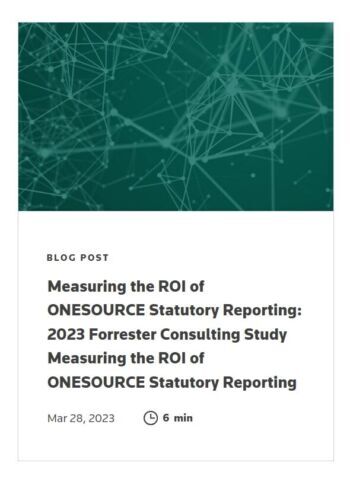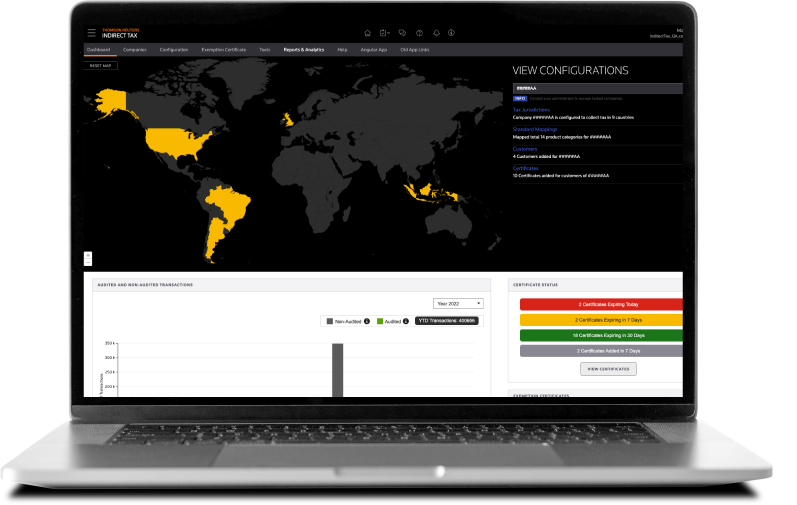Learn about the definition, statutory reporting’s importance, key components, and more.
In the industries of business and finance, statutory reporting is a cornerstone of transparency and compliance. Statutory reporting is a critical process for multinational corporations, involving the preparation and submission of financial statements to comply with legal obligations across various jurisdictions. By engaging in statutory reporting, corporations avoid significant fines, maintain their financial accuracy, and ensure timely submissions that meet all local compliance standards.
Highlights:
|
Jump to ↓
What is statutory reporting?
Statutory reporting is the mandatory disclosure of financial and non-financial information by companies and organizations to designated government agencies and regulatory bodies. This legally required practice plays a pivotal role in fostering accountability, safeguarding stakeholders’ interests, and preserving the integrity of organizations.
The information reported through statutory reporting can vary depending on the jurisdiction, industry, and type of organization. Common examples include financial statements, tax returns, environmental data, employee information, and corporate governance reports. These reports provide valuable insights into an organization’s financial health, environmental impact, workforce management practices, and adherence to legal and regulatory requirements.
The specific requirements for reporting depend on the jurisdiction in which an organization operates. Different countries and regions have their own set of laws, regulations, and accounting standards that govern the reporting process. Organizations must comply with the reporting requirements applicable to their jurisdiction to ensure legal compliance and avoid potential penalties or legal consequences.
Why is statutory reporting important?
Overlooking statutory reporting requirements can lead organizations down a perilous path, fraught with legal entanglements, reputational setbacks, operational hurdles, and financial distress.
Noncompliance invites hefty fines, penalties, and legal actions from government agencies and regulatory bodies, such as restrictions on business activities or revocation of licenses and permits, severely hindering an organization’s ability to operate. In cases where misreporting or fraudulent activities are involved, companies and their responsible individuals may face legal action and potential imprisonment.
Moreover, neglecting statutory reporting compromises an organization’s credibility and trustworthiness. Stakeholders, including investors, customers, and the general public, rely on accurate and transparent financial information to make informed decisions. Failing to provide this vital information erodes trust. Lenders and investors view adherence to statutory reporting obligations as a key indicator of an organization’s governance and transparency practices. Companies that disregard these requirements are often perceived as higher risk and less trustworthy, making it challenging to obtain loans, investments, and favorable credit terms.
Organizations struggling to meet statutory reporting deadlines, manage financial data effectively, and respond promptly to regulatory inquiries face wasted time, resources, and additional expenses. These challenges divert valuable assets from core business operations, hindering productivity and profitability.
 |
|
What are the key components of statutory reports?
Statutory reports provide a comprehensive overview of an organization’s financial health, enabling stakeholders to assess its stability, profitability, and liquidity. The key component are financial statements, which include:
- Balance sheet
- Income statement
- Statement of cash flows
This information serves as a financial roadmap, guiding stakeholders in understanding the organization’s financial performance and position.
Going beyond financial information: ESG reporting
Beyond financial information, statutory reports encompass significant non-financial disclosures that showcase an organization’s commitment to responsible and sustainable business practices. These disclosures highlight sustainability initiatives, employee welfare programs, community involvement, and corporate governance mechanisms. By integrating such information, statutory reports go beyond financial performance, demonstrating a company’s dedication to environmental, social, and governance (ESG) impact.
Depending on the jurisdiction and industry, statutory reports may include additional disclosures mandated by regulatory bodies. For instance, companies in the financial sector may be required to provide information on risk management, capital adequacy, and regulatory compliance. These disclosures enhance transparency, enabling stakeholders to evaluate an organization’s risk management capabilities and adherence to regulatory frameworks.
Auditor reports, which provide independent validation of the accuracy and reliability of the reported financial information, are often included in statutory reports. These reports reinforce the credibility of statutory reports by assuring stakeholders that the presented information has undergone rigorous scrutiny and verification by qualified professionals.

What is the process of statutory reporting?
By following these key steps, companies can effectively navigate the process of statutory reporting, ensuring accuracy, compliance, and transparency. This not only mitigates legal risks but also enhances stakeholder trust and confidence in the organization’s operations and ethical practices.
-
Identify local laws and regulations
The first critical step involves identifying the relevant laws and regulations that mandate statutory reporting in a specific jurisdiction. These regulations may vary across regions and industries, so it’s vital to research and grasp the specific requirements applicable to your organization.
2. Collect and organize the data
The next step is to collect and organize the necessary financial and non-financial data to be included in the reports. This data can encompass a wide range of information, such as financial statements, tax returns, environmental data, and corporate governance reports. It’s crucial to ensure accuracy and completeness when gathering this data, as it forms the foundation of the statutory reports.
3. Prepare the report according to the required format
With the data collected, companies must then prepare the reports in the prescribed format specified by the regulatory bodies. This often involves adhering to specific templates, layouts, and reporting standards. Attention to detail is essential during this stage to ensure that the reports are clear, concise, and compliant with the required format.
4. Submit the statutory report on time
Finally, the prepared reports must be submitted to the appropriate government agencies or regulatory bodies within specified deadlines. Timely submission is crucial to avoid penalties and legal consequences. Companies should establish robust systems and automated processes to ensure that statutory reporting deadlines are consistently met.
What software helps with statutory reporting?
With its advanced cloud-based platform, ONESOURCE Statutory Reporting ensures compliance across over 45 jurisdictions, supports multiple local languages, and offers country-specific reporting templates.
Benefit from timely updates provided by Big Four accounting firms and in-house experts. Streamline your workflow with automated formatting, review processes, and maintain consistency with centralized data management. Choose flexibility with various operational delivery models and utilize translation features to prepare financial statements in English.
Additionally, Thomson Reuters has teamed up with SAP to create a robust ESG reporting solution. The integration plans include combining Thomson Reuters ONESOURCE Statutory Reporting and SAP Sustainability Control Tower, enabling customers to prepare, gather, and file ESG data seamlessly within a unified solution. Learn more about how to elevate your statutory reporting with ONESOURCE.
 |
|